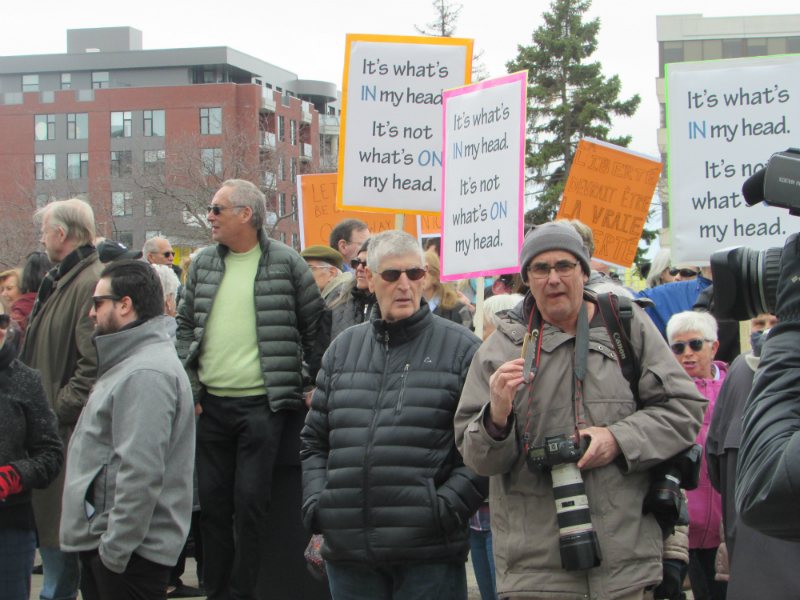Quebec Jews feel less accepted and hopeful about their future, especially for the younger generation, since the province’s secularism law, Bill 21, was passed in 2019, a major study of the impact of the legislation on religious minorities indicates.
Sixty percent of Jews said their sense of being accepted as a “full-fledged member of Quebec society” has deteriorated over the last three years, and about two-thirds are not optimistic about their children’s future in the province.
Conducted by the Association for Canadian Studies (ACS) with the polling firm Léger Marketing, the study (PDF link) included Muslims, Sikhs and Jews. Author Miriam Taylor describes the feedback from these groups about finding themselves in an increasingly inhospitable social climate “unsettling and chilling.”
“This study shows that, for most of the minority religious community members surveyed, life in Quebec since Law 21 was enacted is significantly less peaceful and less harmonious,” the study concludes. The negative impact is “broad-ranging, disruptive and profound, reaching systemic proportions that are anything but moderate… ”
Muslim and Sikh respondents were more likely to say the law has affected them than Jews did.
A key finding among Jewish respondents is that half of men said they were the victim of or witness to a hate crime or incident since the secularism law came into force. One-third of Jewish women reported experiencing such hate, while 46 percent said their sense of safety in public has diminished.
A quarter of Jewish men said they have experienced more discrimination, and many admitted to hiding their identity to avoid discrimination.
Sources of discrimination were wide-ranging, including police, health care and other service providers, in the workplace and at school. Two-thirds felt they were discriminated against by the Quebec government.
A third of women and 40 percent of men reported hearing “prejudicial remarks”, also from many quarters. Half of Jewish women and a third of Jewish men said they are less inclined to express themselves freely in public.
Nearly 40 percent of women said they are less inclined to participate in political and social life.
The 102-page study, entitled Law 21: Discourse, Perceptions & Impacts is described as the most extensive of its kind, combining the results of a survey of 1,828 Quebecers as a whole by Léger during May and June, with the ACS’s inquiry among 632 Muslims, 165 Jews, and 56 Sikhs.
The Jewish population of Quebec is estimated at between 83,000 and 87,000 with half over age 55. Thirty percent are immigrants, about 37 percent arriving before 1971.
Estimates of the number of Muslims and Sikhs are between 320,000 and 330,000, and 10,000 and 10,500, respectively.
One Jewish respondent is quoted: “I get remarks on a daily basis because apparently a lot of French speakers think I should leave where I’m from because they say my French isn’t good enough. I have had police and firefighters hang up on me in an emergency because of my French, telling me, ‘call back when you can speak proper French’.”
Feeling less like full-fledged Quebecers was most pronounced among Muslim women (82.9 percent) and Sikh men (86.7 percent.)
“While the deterioration in the potential to flourish among Jewish men and women (28.6 percent vs. 23.1 percent) may seem lower than that reported among Muslims, it is nevertheless more than double the percentages found among Quebecers overall (7.7 percent vs. 10.9 percent),” the study states.
“The deterioration in mental health among Jewish respondents (men 33.3 percent vs. women 38.5 percent) is also triple the percentage reported by men in Quebec overall (10.5 percent) and more than double those indicated by Quebec women (16.8 percent).”
Quebecers in general surveyed, though they have little contact with religious minorities, ranked these religions on a descending order of regard: Christianity the highest, followed by Judaism, Sikhism and Islam. The strongest supporters of Bill 21 tended to have the least contact with a religious minority and the most negative perceptions. Only 22 percent overall have had contact with Jews, yet 36.6 percent expressed a negative opinion of the kippah.
As polls have shown since the legislation was proposed, a solid majority said they support Bill 21 (63.7 percent), with those identifying as Catholics the highest at 70 percent. Support among women was, significantly, almost 10 percent lower than that among men.
Still, 64.5 percent think the Supreme Court of Canada should determine if the law is discriminatory. The law is currently before the Quebec Court of Appeal.
If it was found to violate the Charter of Rights, support for the law would drop to 46.7 percent – below the crucial majority the Coalition Avenir Québec has held up as proof it represents the “collective will” of the Quebec nation, promoting neutrality and equality.
“The democratic values and aura of inevitability associated with the law, reinforced by the use of the notwithstanding clause, have made it difficult, even problematic, for those voicing a dissenting opinion,” the study states.
“Those who maintain that the law is unconstitutional and contravenes fundamental human rights, including members of the religious communities targeted by the legislation, have had to combat tendencies to label their position as being against Quebec interests, as misunderstanding and even being disloyal to Quebec society.”
Thirty-one percent surveyed see opponents as not being “loyal” Quebecers. At the same time, 56 percent view the law as divisive and 60 percent think a public servant should not lose their job if they do not comply.
The politicization of religious symbols in a society that already has unfavourable perceptions of minority religions make a “potent mix,” the study warns and that could lead to a worsening climate, even violence.
